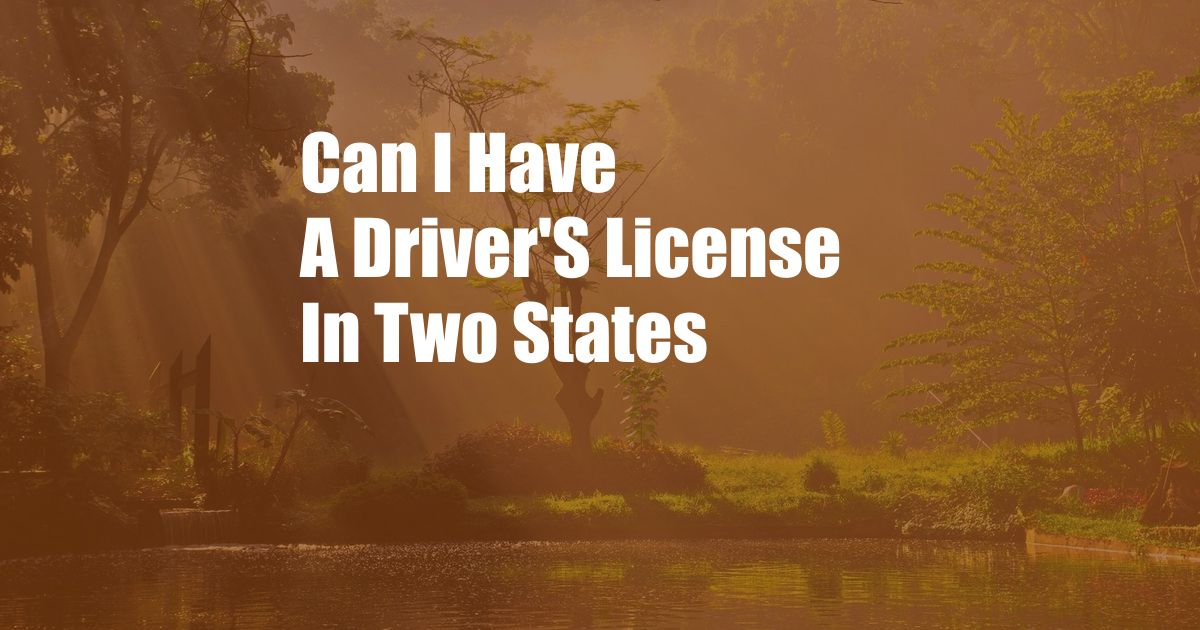
Can You Have a Driver’s License in Two States?
Navigating the complexities of driving regulations can be a perplexing endeavor. One common question that arises is the legality and implications of obtaining a driver’s license in multiple states. To shed light on this subject, this article delves into the intricate details surrounding the issuance and use of driver’s licenses across state lines.
The concept of holding a driver’s license in two or more states is generally discouraged due to legal and administrative complications. However, there are specific scenarios where this practice may be permissible or even necessary. To fully understand the nuances of this topic, let’s explore the various aspects involved.
Understanding Driver’s License Issuance
Each state maintains its own set of laws and regulations governing the issuance of driver’s licenses. Typically, an individual can only possess a valid driver’s license issued by the state in which they reside. This is primarily due to the need for accurate and up-to-date information, such as residency, medical history, and driving record, to be readily accessible to the licensing authority.
To obtain a driver’s license, applicants must provide proof of residency within the state. This may include presenting documents such as a utility bill, lease agreement, or mortgage statement. Additionally, applicants are required to pass a vision test, demonstrate knowledge of traffic laws, and undergo a driving exam to assess their skills.
Residency and Driver’s License
The concept of residency plays a pivotal role in driver’s license issuance. Residency, as defined by the state, determines the individual’s eligibility to obtain a license within that jurisdiction. Establishing residency typically involves maintaining a physical address, registering to vote, and paying taxes in the state. In most cases, individuals are considered residents of the state where they reside for the majority of the year.
Residency requirements vary from state to state, but they generally align with the principle of having a fixed and permanent place of abode within the jurisdiction. This requirement ensures that the licensing authority has appropriate oversight and can promptly address any traffic violations or other issues related to the driver.
Exceptions and Special Cases
While obtaining a driver’s license in two states is generally not recommended, there are certain exceptions and special cases where it may be permitted or necessary. One such scenario is when an individual has a primary residence in one state but maintains a secondary residence or employment in another state.
In these instances, some states allow individuals to obtain a “non-resident” driver’s license. This type of license is issued to individuals who do not meet the residency requirements of the state but need to operate a motor vehicle within its borders for legitimate purposes. Non-resident licenses may have specific restrictions and limitations compared to regular driver’s licenses.
Consequences of Holding Multiple Licenses
Possessing multiple driver’s licenses can lead to legal and administrative consequences. Each state treats this situation differently, but it is generally considered a violation of the law. Holding multiple licenses can result in the suspension or revocation of driving privileges in one or both states.
Furthermore, maintaining accurate and consistent driving records becomes challenging when an individual holds multiple licenses. This can lead to confusion and potential penalties if traffic violations or accidents occur in different states.
Tips for Avoiding Multiple Licenses
To avoid the complications associated with multiple driver’s licenses, it is crucial to adhere to the following tips:
- Establish a clear and permanent primary residence in a single state.
- Obtain a driver’s license only in the state where you reside.
- If you need to drive in another state for extended periods, consider obtaining a non-resident driver’s license in that state.
- Inform the licensing authority promptly if you change your primary residence or driving habits.
- Keep your driving records updated and accurate in all states where you may operate a motor vehicle.
FAQs on Driver’s Licenses in Multiple States
Q: Can I have a driver’s license in two states if I have a primary residence in one state but work in another?
A: In some cases, you may be eligible for a non-resident driver’s license in the state where you work. However, it is essential to consult with the licensing authorities in both states to determine your eligibility and any restrictions or limitations that may apply.
Q: What are the penalties for holding multiple driver’s licenses?
A: The consequences vary by state but can include the suspension or revocation of driving privileges, fines, and potential legal charges.
Conclusion
Navigating the complexities of driver’s license regulations across multiple states requires a thorough understanding of the laws and procedures involved. While obtaining a driver’s license in two or more states is generally discouraged, exceptions and special cases may arise. To avoid legal and administrative complications, it is crucial to establish a clear primary residence, adhere to residency requirements, and keep driving records up-to-date.
If you have any further questions or require additional information regarding this topic, we encourage you to consult with your local licensing authority. Their expertise and guidance will assist you in making informed decisions and ensuring compliance with the laws governing driver’s licenses in multiple states.